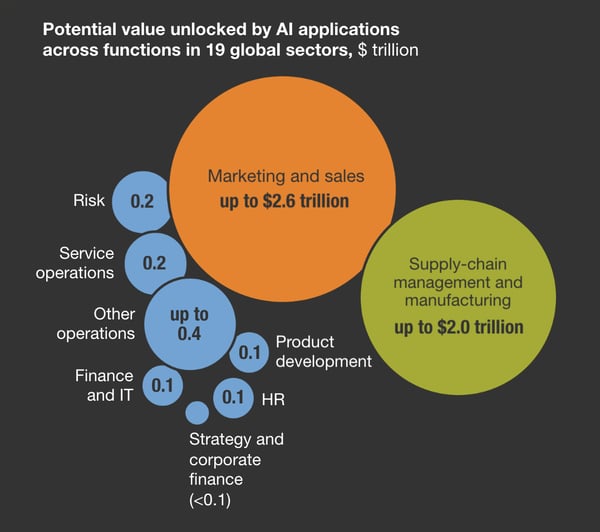4 Marketing AI Predictions for 2020, According to Experts
According to Gartner, 80% of technology will be built on an AI foundation by 2021.
As AI becomes more prominent across industries, it's also impacting marketers in subtle ways that might not be obvious to them yet.
While this technology was once described as "over-hyped," marketers now use a handful of AI-powered tools in their day-to-day tasks.
For example, AI tools help content strategists define SEO and keyword strategies, perform SEO-related tasks like fixing duplicate content, and self-optimize mobile pages.
Sign up for HubSpot Academy's ML & AI Lesson
[Free Online Course]
Aside from SEO, AI can assist marketers in tasks like drafting email subject lines and creating basic social media content. Meanwhile, this technology also helps with important, but time-consuming tasks, like deduplicating contacts and recording market intelligence data on both customers and competitors.
And although the technology is still rather new, the list of tasks it can complete is steadily growing.
At that Marketing AI Institute, we track more than 1,500 AI companies with combined funding of more than $6 billion.
As the institute's director, I’ve spent years studying the AI market while working with some of the brightest AI minds in marketing. Aside from researching and consulting on AI strategies, I've also used AI tools throughout my marketing career. Through these experiences, I've gained insights into the opportunities that AI could realistically provide for marketers now and in the near future.
While AI has already subtly crept into the day-to-day lives of many marketers, it's likely to have even more of an impact on them in the future. According to McKinsey, AI is expected to have up to $2.6 trillion worth of business impact in sales and marketing alone.

Source: McKinsey
Despite all of the positivity around AI, many marketers are still might be skeptical about which technologies are actually useful, and which could turn out to be overpriced hype. After all, in the past, there have been a number of outlandish and inaccurate AI predictions or claims. These false statements -- which many AI experts call "snake oil" -- have made it hard to distinguish which AI facts are actually real and which are lies told to gain media attention.
To determine where the true opportunities lie with AI in this stage of its development, it's important to do research to learn more about the tools and current strategies that other marketers are using. You'll also want to look at research-backed trends to keep certain tactics on your radar in case they might be beneficial to you in the future.
To help you better understand where AI is going and how you could leverage it to build a competitive strategy in the future, I've used my research and professional experiences in the AI space to compile a list of four key trends to watch in the next year.
4 AI Predictions for 2020
1. Content marketers will have to adopt artificial intelligence.
No. Artificial intelligence can't write compelling long-form content just yet. But, although bots aren't able to create long narratives, books, scripts, or detailed online articles, AI can still streamline a number of content marketing tasks. According to Jeff Coyle, Co-Founder and Chief Product Officer of MarketMuse, this trend will only continue in 2020.
“This will be the year that brands begin to seriously use artificial intelligence to build a competitive advantage,” says Coyle. “Right now, many companies are still exploring AI and its potential. But the technology is already having a huge impact on content marketing.”
“The brands using AI tools are already seeing outsized benefits, like huge traffic gains and better search rankings,” Coyle adds.
While AI tools help marketers in drafting light content such as social media updates, online ad content, and email subject lines, Coyle says that many companies are using AI to analyze thousands of ranking opportunities in seconds, identify gaps in their strategies, and create content that skyrockets search traffic.
As a marketing professional who's done much research on the topic of AI, I believe him. In our own report on the top 25 AI use cases marketers value, analyzing existing content for gaps and opportunities tops the list.
Comments
Post a Comment